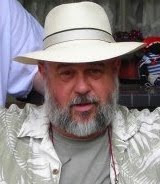Just as you can't tell the story of the Walnut Valley Festival without Stu Mossman, you also cannot tell the story of the Ozark Folk Center without Jimmie Driftwood.
The Folk Center was originally conceived of as a way to showcase (and create markets for) indigenous crafts from the Mountain View area of Arkansas. As almost an afterthought, the organizers wondered about bringing music in - you know, to make people so happy that they would want to buy stuff. The logical choice to head that up was Jimmie Driftwood, recently returned resident with some minor notoriety in Nashville and on the Grand Ole Opry, and some fairly major royalty checks from his two big hits, "The Battle Of New Orleans" and "The Tennessee Stud". Expectations were that he would fill the hall with Nashville stars, and I guess if that had happened they might have beaten Branson to being Branson. Instead, Jimmie Driftwood felt that the local musicians represented a unique musical tradition, and that this was the music that should grace the halls of the Ozark Folk Center. People who had never been on a stage before were suddenly on one every Saturday night, and very soon, headliners at a major folk festival. The plaintive and sometimes raw voices of Stone County became the highlight of the Ozark Folk Center, always under the careful direction of Mr. Driftwood, who had a skill for focusing on what any given musician could do best.
Then another pretty miraculous thing happened, the Folk Center was taken over by the park service, insuring it's longevity and eliminating any chance of the Branson thing ever happening in Mountain View. This also made it one of the very few state parks centered on culture instead of recreation. The Arkansas Folk Festival flourished all through the sixties, and continues today.
Then came the split, over a bass fiddle, the story goes. Jimmie asked high and low throughout Stone County - no one had ever owned a stand-up bass, or played one. Now that part of Arkansas is as isolated as anywhere in this country, there's not a lot of folks passing through - so if the locals didn't have one - it didn't exist, and Jimmie's position was that it shouldn't be used on-stage as a representation of the indigenous music of the area. Others disagreed, obviously wanting a fuller musical range, and later, some more contemporary songs. The musical styles remained very similar, an outsider might not have been able to tell the difference without it being pointed out to them, but the split was deep - ideology fueled by jealousies, power trips and personality conflicts. The two groups ended up playing on separate nights, and Jimmie Driftwood was eventually fired. Concerts continued at the Folk Center under the Mountain View Folklore Society, and Jimmie continued his jams at the big barn at his home every Friday night. Word spread far and wide that anyone was welcome to come to the jam , and if you brought a sleeping bag, you could sleep in the barn at the end of the evening. The music continued, but the rift in the music community would live on for many years. A wonderful oral history of the performers and organizers of the Arkansas Folk Festival and the Ozark Folk Center can be found at http://www.lyon.edu/webdata/groups/library/rcol/oralhistory.htm
Jimmie Driftwood is mentioned in our post from September 4th, as he was a featured performer at the Southwestern Folk Festival in 1967. He died in 1998, less than a year before the passing of Stuart Mossman.
We know for a fact that there was a group of Southwestern students at one of those early festivals in Mountain View, and that several of the performers that they heard there ended up playing for their little festival in Winfield, Kansas, in 1967, and in later years, as well. They, too, had an ideology, but also just a thirst for knowledge about the folk culture that was all around them. They did not claim to be experts. They were merely seeking knowledge, and seeking it in the most direct way possible - by inviting performers into their town and into their homes. Also, from the very beginning, hands-on workshops with performers were made available to all festival attendees.
In some ways, a person might think that a huge festival in a small mid-western town in the early 00's might find failure in the fact that half of the folks never even enter the grandstands to watch the festival acts. However, these festivals were set up from day one to be participatory events. It is a testament to the vision of these early organizers that the campgrounds in Winfield have taken on their own life, with their own communities and their own stages. In every imaginable way, Walnut Valley remains a folk festival.
Next: The official position of the Southwestern College Folk Festival staff (One of the best I've heard)
.
Sunday, September 30, 2007
Subscribe to:
Post Comments (Atom)

1 comment:
Old Folkie--- Thanks for the insights. Can't wait for more!!!
Post a Comment